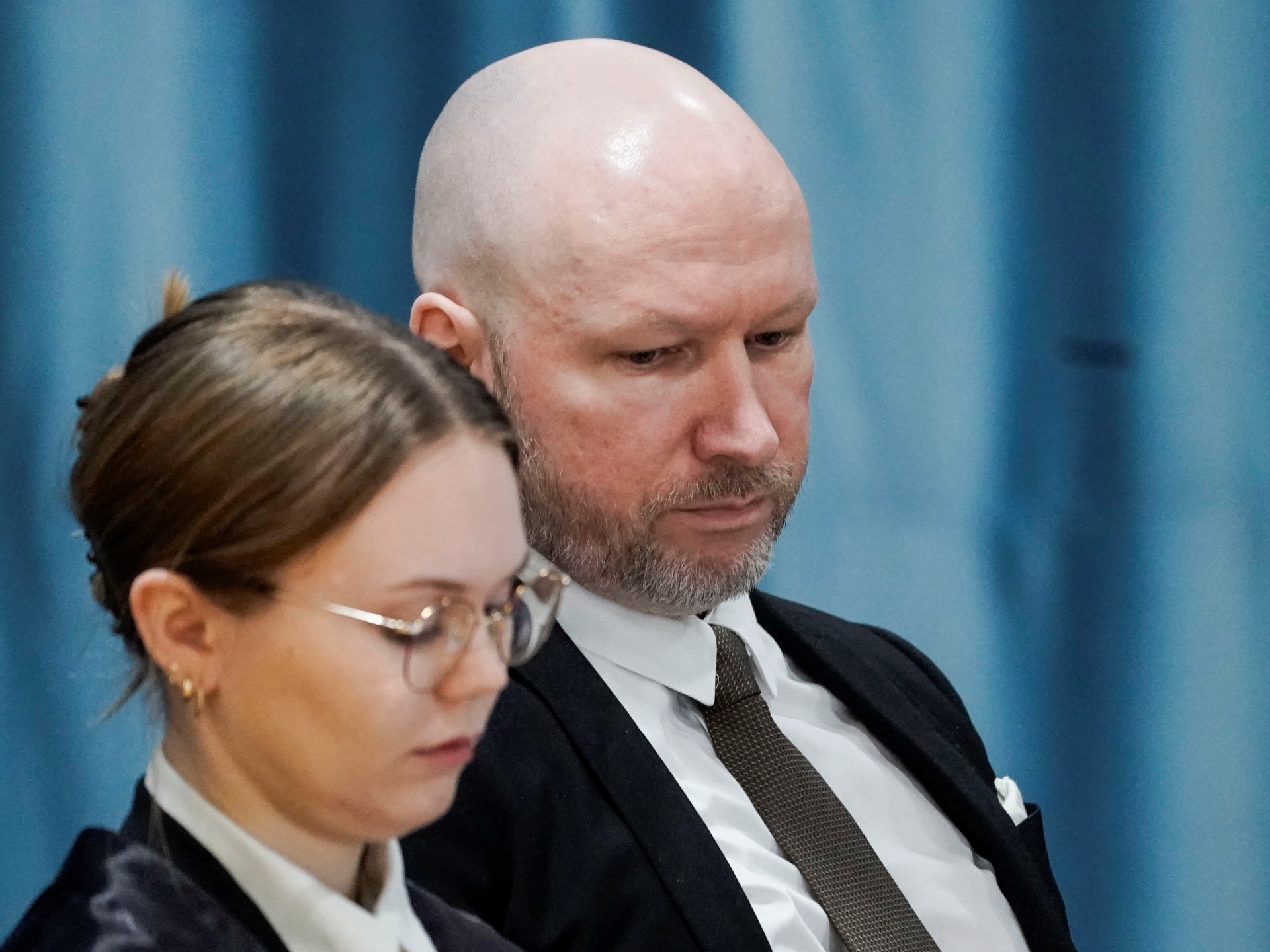Norway court says mass killer Breivik’s prison isolation not ‘inhumane’

Serving a prison sentence for killing 77 people in 2011, Breivik has access to a kitchen, fitness room and TV with Xbox.
Norwegian mass killer Anders Behring Breivik will remain in isolation in prison after he lost his legal attempt to end the conditions imposed on him by the state.
The neo-Nazi, who killed 77 people in a bombing and shooting rampage in 2011, sued the Norwegian state in January, arguing his prison conditions violated his human rights.
“The Oslo District Court has, after an overall assessment, concluded that Breivik’s sentencing conditions are not a violation of human rights,” the court said in a statement accompanying its verdict on Thursday.
Breivik, who changed his name to Fjotolf Hansen, is serving a 21-year sentence, the maximum penalty at the time of his offences, which may be extended for as long as he is deemed a threat to society.
He has been held in isolation since 2012 for his crimes, which include killing eight people with a car bomb in Oslo and gunning down 69 others, most of them teenagers, on Utoya island, on July 22, 2011 – the deadliest violence in Norway since World War II.
Breivik argued his isolation amounted to “inhumane” punishment under the European Convention on Human Rights. But the court rejected his claim against the Norwegian Ministry of Justice and Public Security.
“Breivik has good physical prison conditions and relatively great freedom in everyday life,” Judge Birgitte Kolrud said in the ruling.
“There has been a clear improvement in the sentencing conditions” and there was “no evidence of permanent damage from the punishment”, she added.
Breivik, 45, was transferred two years ago to Ringerike Prison, where he is held in a two-storey complex with a kitchen, dining room and TV room with an Xbox, several armchairs, and black and white pictures of the Eiffel Tower on the wall.
He also has a fitness room with weights, a treadmill and a rowing machine, and three parakeets fly around the complex.
‘Well treated’
“Breivik is particularly well treated,” prison director Eirik Bergstedt testified at the court hearing last month.
The case took place over five days at Breivik’s high-security prison, set on the shore of Tyrifjorden lake, where Utoya also lies.
“In summary, the court has come to the conclusion that the sentencing conditions cannot be said to be, or to have been, disproportionately burdensome,” Thursday’s verdict said.
Breivik has shown no remorse for his attacks and is still considered dangerous by the Norwegian authorities.
During his testimony at the hearing, he shed tears, saying he was suffering from depression and suicidal feelings.
However, Janne Gudim Hermansen, the prison-appointed psychiatrist who has met with Breivik since he was transferred to Ringerike, testified at the hearing that she was in doubt about the tears, saying, “I think perhaps this was used to achieve something.”
Breivik lodged a similar legal claim in 2016 and 2017.
In 2016, the Oslo District Court stunned the world when it ruled his isolation was a breach of his rights.
However, on appeal, Norway’s higher courts found in the state’s favour, and the European Court of Human Rights in 2018 dismissed his case as “inadmissible”.
Thursday’s ruling was immediately appealed by Breivik, the Norwegian newspaper Aftenposten reported.
Related
Yaslen Clemente Shows Off Leg Day Gains and Shares Her…
Yaslen Clemente isn't just an influencer—she's a fitness powerhouse. The social media star is known for her intense workouts, and she recently sha
Samantha Espineira Stuns in Blue Swimsuit and Shares Her 5…
Samantha Espineira knows how to turn heads, both on and off the runway. The successful model and Instagram influencer regularly shares breathtaking
The Best Fitness Trackers To Help You Reach Any Health…
Best Health Tracker: Oura Ring 3Why We Love It: I’ve tried many, many fitness trackers—but I tend not to stick with one watch or band for very long. I’ve
#CycleSyncing debunked: Popular TikTok trend not backed by science
A new study has debunked a popular TikTok wellness trend called cycle syncing, which claims that tailoring a workout routine to match the hormonal changes that












